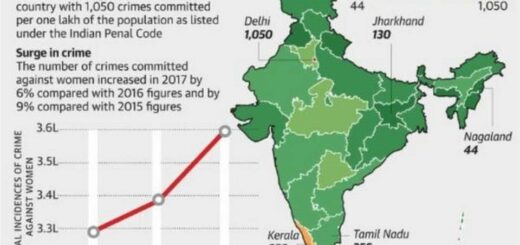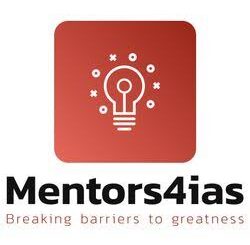National Current Affairs – UPSC/IAS Exams- 26th December 2019
Topic: Polity and Governance
In News: India has dropped four points from 2018, to take the 112th rank on the World Economic Forum’s Gender Gap Index.
More on the Topic:
- The Index measures the extent of gender-based gaps on four key parameters — economic participation and opportunity, educational attainment, health and survival, and political empowerment.
- Notably, it measures gender-based gaps in access to resources and opportunities in countries, rather than the actual levels of the available resources and opportunities.
- Despite a small score improvement, India has lost four positions as some countries ranked lower than India have shown better improvement. The country has reportedly closed two thirds of its overall gender gap, with a score of 66.8%, but the report notes with concern that the condition of women in large fringes of Indian society is ‘precarious’.
- Economic Gender Gap: Of significant concern is the economic gender gap, with a score of 35.4%, at the 149th place, among 153 countries, and down seven places since the previous edition, indicating only a third of the gap has been bridged.
- The participation of women in the labour force: is also among the lowest in the world, and the female estimated earned income is only one-fifth of male income.
- Health and Survival: An alarming statistic is India’s position (150th rank) on the very bottom of the Health and Survival subindex, determined largely by the skewed sex ratio at birth, violence, forced marriage and discrimination in access to health.
- Education: It is on the educational attainment (112th rank) and political empowerment (18th rank) fronts that the relative good news is buried.
Way Ahead:
- There is no question that the Gender Gap Index presents India with an opportunity to make the necessary amends forthwith.
- Doing what the government is currently doing is clearly not going to be sufficient; it needs to engage intimately with all aspects indicated by the Index to improve the score, and set targets to reduce the gender gap in the foreseeable future.
- It will have to drastically scale up efforts it has introduced to encourage women’s participation, and increase opportunities for them.
- To do so it also needs to make sure there is actual implementation at the ground level.
Source: Hindu
Run Through File Mechanism-Haryana
Topic: Government Initiatives
In News: To ensure that important government matters don’t get delayed owing to conflicting hierarchical and departmental priorities, the Haryana government has introduced a “Run Through Files” mechanism.
More on the Topic:
- This is a new provision in the Centralised File Movement and Tracking Information System (CFMS).
- A file shall be marked as Run Through Files only by the CM in the CFMS.
- Every file marked as RTF has to be cleared on priority greater than that is currently being accorded to the files marked top priority.
- At whichever level any contribution other than mere signing on the file is made, the same will also be uploaded on CFMS portal.
- A system generated SMS and email will automatically be sent on each downward or upward movement of the file.
Source: Hindu
Mental Health Disorders in India
Topic: Social Justice/Health
In News: Lancet Psychiatry has published the first comprehensive estimates of disease burden attributable to mental health from 1990 prepared by the India State-Level Disease Burden Initiative.
More on the Topic:
- The study finds that roughly one in seven Indians, or 197 million persons, suffered from mental disorders of varying severity in 2017. These include depression, anxiety disorders, schizophrenia, bipolar disorders, idiopathic developmental intellectual disability, conduct disorders, and autism.
- The contribution of mental disorders to the disability adjusted life year (DALY), the sum of total years of life lost and years lived with disability has doubled between 1990 and 2017 increasing from 2.5% to 4.7%.
- Mental disorders were the second leading cause of disease burden in terms of years lived with disability (YLDs) and the sixth leading cause of disability-adjusted life-years (DALYs) in the world in 2017.
- In total, 45.7 million people had depressive disorders, as one in three years lost due to a mental disorder was due to depression. This was followed by anxiety a total of 44.9 million people suffered from it and it accounted for the loss of 1 in 5 years.
State-wise Analysis:
- Tamil Nadu, Kerala, Telangana, Karnataka and Andhra Pradesh account for a higher prevalence of mental disorders that manifest primarily during adulthood in depression and anxiety.
- Among depressive disorders, the prevalence is the highest in Tamil Nadu (4,796 per 100,000), followed by Andhra Pradesh (4,563), Telangana (4,356), Odisha (4,159) and Kerala (3,897).
- In case of anxiety disorders, the prevalence is highest in Kerala (4,035), followed by Manipur (3,760), West Bengal (3,480), Himachal Pradesh (3,471) and Andhra Pradesh (3,462).
- For conduct disorders, Jharkhand and Bihar have the highest prevalence, at 983 and 974 per 100,000 people.
- At 6,339 and 5,503 per lakh respectively, Bihar and Uttar Pradesh have the highest prevalence of idiopathic developmental intellectual disability.
Source: The Hindu
Topic: Security Issues
In News: The Union Cabinet has approved to create the post of Chief of Defence Staff.
More on the Topic:
- The CDS will be in the rank of a four-star General with salary and perquisites equivalent to a Service Chief.
- He will also head the Department of Military Affairs (DMA), to be created within the Ministry of Defence and function as its Secretary.
- The Chief of Defence Staff, apart from being the head of the Department of Military Affairs, will also be the Permanent Chairman of the Chiefs of Staff Committee.
- He will act as the Principal Military Adviser to Raksha Mantri on all tri-Services matters.
- The three Chiefs will continue to advise RM on matters exclusively concerning their respective Services.
- CDS will not exercise any military command, including over the three Service Chiefs, so as to be able to provide impartial advice to the political leadership.
- Tri-service agencies/organisations/commands related to Cyber and Space will be under the command of the CDS.
Mandates:
- CDS will administer tri-services organisations.
- CDS will be member of Defence Acquisition Council chaired by Raksha Mantri and Defence Planning Committee chaired by NSA.
- Function as the Military Adviser to the Nuclear Command Authority.
- Bring about more cooperation in operation, logistics, transport, training, support services, communications, repairs and maintenance, etc of the three Services, within three years of the first CDS assuming office.
- Ensure optimal utilisation of infrastructure and rationalise it through jointness among the services.
- Implement Five-Year Defence Capital Acquisition Plan (DCAP), and Two-Year roll-on Annual Acquisition Plans (AAP), as a follow up of Integrated Capability Development Plan (ICDP).
- Assign inter-Services prioritisation to capital acquisition proposals based on the anticipated budget.
- Bring about reforms in the functioning of three Services aimed at augmenting combat capabilities of the Armed Forces by reducing wasteful expenditure.
Source: Hindu
Topic: Government Policies
In News: The Cabinet approves the release of funds for 10 projects of the Swadesh Darshan Scheme sanctioned in 2018-19.
More on the Topic:
- Under the scheme ‘Swadesh Darshan’, the Ministry of Tourism provides Central Financial Assistance (CFA) to State Governments/Union Territory Administrations for infrastructure development of circuits.
- Under the Scheme 15 circuits have been identified for development namely Himalayan Circuit, North East Circuit, Krishna Circuit, Buddhist Circuit and Coastal Circuit, Desert Circuit, Tribal Circuit, Eco Circuit, Wildlife Circuit, Rural Circuit, Spiritual Circuit, Ramayana Circuit, Heritage Circuit, Tirthankar Circuit and Sufi Circuit.
Provisions of the Scheme:
- 100% centrally funded for the project components undertaken for public funding.
- To leverage the voluntary funding available for Corporate Social Responsibility (CSR) initiatives of Central Public Sector Undertakings and corporate sector.
- Funding of individual project will vary from state to state and will be finalised on the basis of detailed project reports prepared by PMC (Programme Management Consultant).
- PMC will be a national level consultant to be appointed by the Mission Directorate.
- A National Steering Committee (NSC) will be constituted with Minister in charge of M/O Tourism as Chairman, to steer the mission objectives and vision of the scheme.
- A Mission Directorate headed by the Member Secretary, NSC as a nodal officer will help in identification of projects in consultation with the States/ UTs governments and other stake holders.
Source: Hindu
Topic: Government Policies
In News: Prime Minister Narendra Modi launched a scheme to conserve ground water in regions with low water tables.
More on the Topic:
- It is a Rs.6000 crore World Bank approved Central Sector Scheme of the Ministry of Jal Shakti.
- The funding pattern is 50:50 between Government of India and World Bank.
- The programme is expected to lay emphasis on the recharge of groundwater resources and a better exploitation of the groundwater resources, with the involvement of people at the local level.
- The scheme will be implemented and looked over by the Ministry of Water Resources, River Development and Ganga Rejuvenation.
- It is proposed to be launched in Madhya Pradesh, Uttar Pradesh, Rajasthan, Karnataka, Haryana, Maharashtra, Gujarat across 78 districts, 193 blocks and about 8300 gram panchayats.
- To encourage community participation, it has been planned by the government to give 50% of the money to gram panchayats and states as incentives for achieving the groundwater management targets.
Model Mains Question: India is running Out of water resources –principally ground water resources at an alarming rate. Analyse the reason and suggest some measures.
Source: PIB


















